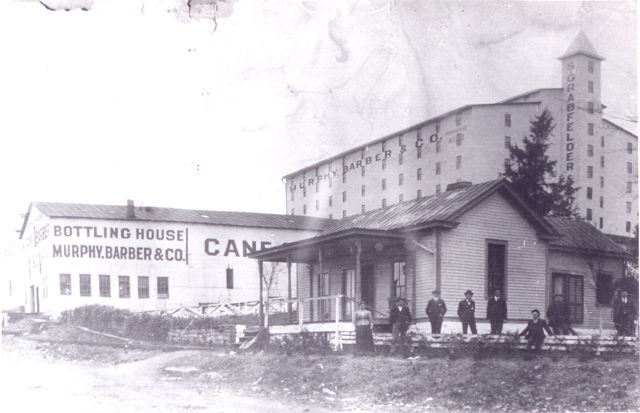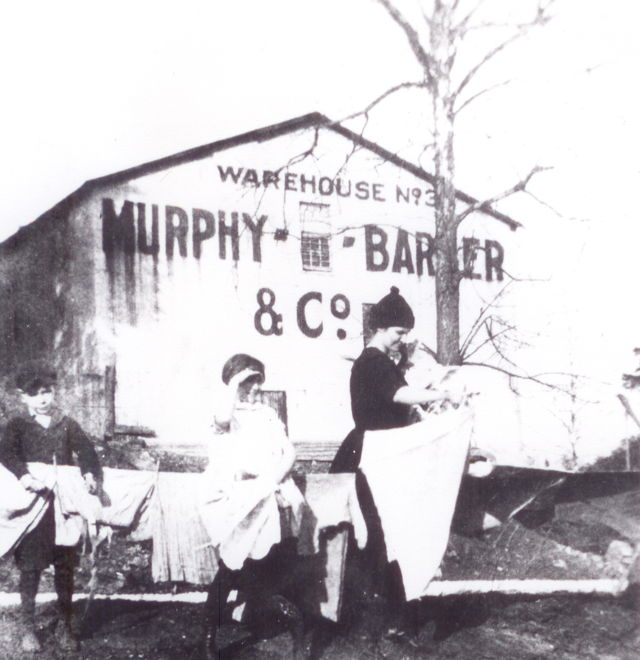
The following case is taken from The Kentucky Law Reporter, [Volume 33, No. 1, (July 1, 1908), pages 716-718] a semimonthly magazine, reporting in full all the decisions of the Court of Appeals.
Its interest to us is its description of the final years of the Murphy, Barber & Company distillery located in Clermont, Kentucky, within Bullitt County.
Two pictures of the distillery may be seen following the case transcription.
WILSON, RECEIVER v. MURPHY'S ADM'R., &c
MURPHY'S ADM'R., &c. v. WILSON & MUIR, &c.
(Filed June 9, 1908 - Not to be reported.)
1. Attorneys at Law - Services for Partnership - Payable Out of Partnership Funds - In this case evidence considered and held that a fee of $750, paid to W. for his services as attorney for a distillery firm, which had been dissolved by the death of one of the firm, being for the benefit of the partnership property, was properly payable out of the partnership funds.
2. Receivers - Settling Partnership - Allowances for Services - In allowing the fee of a receiver of a distillery company, which had been dissolved by the death of one of the partners, who was more of a caretaker than any thing else, his principal business being to sign withdrawals of whisky and looking after the distillery when not in operation for several years, the witnesses fixed the value of his services at from $5,000 to $10,000. This trial court allowed him $2,750. Held - That the allowance was not too small.
John S. Kelley for receiver Wilson.
Geo. S. & J. A. Fulton for Murphy's Adm'r, &c.
John D. Wickliffe for Wilson & Muir. &c.
Appeals from Nelson Circuit Court.
Opinion of the court by Williams Rogers Clay, Commissioner, affirming.
These two appeals grew out of the same transactions, and will be considered together. In the appeal of Squire Murphy's Administrator. &c. v. Wilson & Muir, &c., the question is, whether the fee of John D. Wickliffe should be paid by appellees or out of the funds belonging to the partnership of Murphy, Barber & Company. This question, we shall first consider.
Squire Murphy and A. M. Barber were partners engaged in the distillery business under the firm name of Murphy, Barber & Company. They resided in Nelson county, Kentucky, but their plant was located just beyond the county line, in Bullitt county, at Clermont. Squire Murphy died in August, 1893, leaving a will which was probated in Nelson county. After making some special devises, the testator directed his executor to hold the balance of his estate and operate the distillery in the firm name of Murphy. Barber & Company, until such time (not exceeding three years) as the distillery property could be sold at a fair price and the money collected; then a settlement should be made. The testator appointed his partner, A. M. Barber, as executor of his will, who qualified and entered upon his duties. At this time there was a great depression in the whisky trade. The executor, who was also the surviving partner, continued the business until September, 1896, when the three years named in the will expired. At this time there was still a depression in the whisky business. Under this condition of affairs, a contract was entered into between the executor and surviving partner, A. M. Barber, and the devisees of Squire Murphy, by which the partnership was to continue for one year longer. Before anything was done under this contract, A. M. Barber also died. Thus the partnership and contract for a continuance of the business were terminated, leaving a valuable distillery plant with about 9,000 barrels of whisky in bond in the warehouses, about one-half of which was pledged to banks for the money that had enabled the firm to make the whisky. Some of it had been sold, and was held in storage for the owners; the residue belonged to the firm.
Neither of the deceased partners had a personal representative, and this valuable property was uncared for. and unprotected. Under this state of case, a consultation was held by Wilson & Muir, the largest creditors, the devisees of Squire Murphy, and John Barber, the son of A. M. Barber and representative of the heirs of said decedent, and John D. Wickliffe, attorney for Wilson & Muir, in which it was agreed that suit should be instituted by Wilson & Muir against the devisees and heirs at law of the deceased partners, asking for the appointment of a receiver to take charge of, and sell the partnership property, pay the debts and bring about a settlement of the partnership affairs. This suit was immediately prepared, the petition filed and all parties in interest brought before the court. On November 26th, seven days after the death of A. M. Barber, the circuit judge was appealed to to appoint a receiver. At the time the application was made, a writing was filed with the judge, signed by the devisees of Squire Murphy and the adult heirs of A. M. Barber, asking for the appointment of a receiver and suggesting Eugene Wilson as a suitable person to take charge of the property. Thereupon Wilson was appointed. After that time, John D. Wickliffe continued to act as the attorney of Wilson, giving him advice in the management of the property and assisting him in the preparation of the reports which he filed as receiver.
Counsel for the Murphy and Barber estates insist that, as each of these estates was represented by attorneys, and, as the suit for a receiver was filed on behalf of one of the principal creditors, It would be unjust to charge the estates with the payment of the fee of $750 allowed Wickliffe. It is true, the Murphy & Barber estates each had attorneys, but it appears that their time was chiefly occupied in litigating matters in dispute between these two estates. While it is true, that John D. Wickliffe was attorney for the appellees, it is also true, that he was attorney for the receiver. Charles Bakrow, a wholesale liquor dealer of Louisville purchased some ot the partnership whisky from the receiver, for which he failed to pay. The record shows that Wickllffe instituted the necessary proceedings to compel Bakrow to pay the money, and succeeded in getting the money. As both the parties were dead at the time the suit for a receiver was instituted, and, as there was no one to take charge of the property, it was necessary that some action be taken to protect the estate. This was done on the application of one of the principal creditors, but with the consent and co-operation of the other creditors and representatives of the two estates. We, therefore, conclude that the services rendered by John D. Wickliffe were for the benefit of the partnership property, and that his fee was properly payable out of the partnership funds.
We shall next consider the question of the allowance to the receiver, Eugene Wilson. Wilson acted as receiver for a period of 43 months. During that time he made a few visits to the distillery plant and wrote several letters. At the time he took charge the debts of the partnership, secured by lien on the whisky, amounted to about $40,000. At the end of the receivership he turned over to the unsecured creditors and representatives of the Murphy and Barber estates about $40,000. The receiver was the son of William Wilson, one of the stockholders in the bank of Wilson & Muir, a creditor of the partnership to the extent of about $32,000. At the time of his appointment and throughout the term of his services as receiver, he was the cashier of the bank of Wilson & Muir. During that time, he also conducted a large insurance business. The trial court allowed the receiver a fee of $2,750. A number of witnesses testified that Wilson's services were worth from $5,000 to $10,000. Counsel for the receiver insist that the large amount of money turned over by the receiver to the estates of Murphy and Barber was the result of his careful management and foresight in the performance of his duties as receiver. On the other hand counsel for appellees insist that the sum turned over to the estate; was not due to any work or foresight on the part of the receiver, but was due entirely to the natural advance in the price of whisky. In cases of this character, we necessarily rely to a large extent upon the judgment of the chancellor. The distillery was not operated. The receiver was more of a caretaker than anything else and even the burden of taking care of the property was imposed upon others. Where his efforts consisted principally of signing withdrawals of whisky and of looking after the distillery property not in operation, and where these duties were not so exacting as to interfere with his insurance business or his work as cashier of the Wilson & Muir bank, we are unable to say that the allowance of $2,750, made by the court below, Is too small.
Wherefore, the judgment in each case is affirmed.


If you, the reader, have an interest in any particular part of our county history, and wish to contribute to this effort, use the form on our Contact Us page to send us your comments about this, or any Bullitt County History page. We welcome your comments and suggestions. If you feel that we have misspoken at any point, please feel free to point this out to us.
The Bullitt County History Museum, a service of the Bullitt County Genealogical Society, is located in the county courthouse at 300 South Buckman Street (Highway 61) in Shepherdsville, Kentucky. The museum, along with its research room, is open 10 a.m. to 4 p.m. Monday through Friday. Saturday appointments are available by calling 502-921-0161 during our regular weekday hours. Admission is free. The museum, as part of the Bullitt County Genealogical Society, is a 501(c)3 tax exempt organization and is classified as a 509(a)2 public charity. Contributions and bequests are deductible under section 2055, 2106, or 2522 of the Internal Revenue Code. Page last modified: 12 Sep 2024 . Page URL: bullittcountyhistory.org/bchistory/murphybarberdist.html